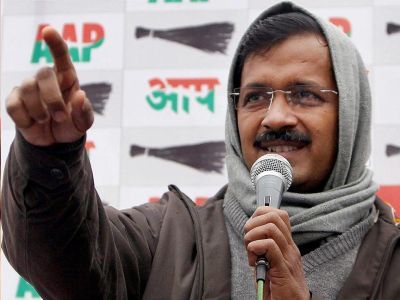'Win or lose, the BJP's Delhi unit is clearly in a mess. Its behaviour offers a textbook example in how not to approach an election,' says T V R Shenoy.
 I left Delhi shortly after Republic Day, and have been in either Kerala or Karnataka ever since. But, much to my surprise, from Thiruvananthapuram to Bengaluru, whether on trains, by road, or at airports, I found many asking the same question: How will Kejriwal fare in Delhi?
I left Delhi shortly after Republic Day, and have been in either Kerala or Karnataka ever since. But, much to my surprise, from Thiruvananthapuram to Bengaluru, whether on trains, by road, or at airports, I found many asking the same question: How will Kejriwal fare in Delhi?
This may astonish self-obsessed Delhiites -- who receive a totally different impression from the capital-based media -- but the rest of India didn't really care who the chief minister of the city-state would be when Vidhan Sabha polls were held in December 2013.
Nor was Arvind Kejriwal much of a talking point in much of India even when he chose to run against Narendra Modi in Varanasi.
So, what has changed?
Arvind Kejriwal's principal publicity manager has been the BJP itself. But part of the curiosity is also due to the two chief contenders for the chief ministership and to two very different approaches to governance.
The BJP could, and should, have called for early elections in Delhi to take advantage of the support demonstrated in the Lok Sabha elections, where it won all of Delhi's seven parliamentary seats, taking a clear lead in 60 of the city's 70 assembly segments.
Instead, the party dithered though nobody in the BJP could explain quite what it hoped to achieve.
Did the BJP think that given time it could do better than winning 60 out of 70? Or was it hoping for defections from the Aam Aadmi Party and the Congress?
In a crowning folly, Sher Singh Dagar, vice-president of the BJP's Delhi unit, was caught in a sting operation, apparently trying to bribe Aam Aadmi Party MLAs to defect. This added substance to the Aam Aadmi Party's charge that the BJP was shirking from the polls.
Brilliantly, the Aam Aadmi Party then went to the Supreme Court to demand an explanation why there were no fresh polls in Delhi. The BJP hemmed, the BJP hawed, and the BJP finally conceded that elections were needed.
A week is a long time in politics -- and the BJP gave the Aam Aadmi Party eight months.
When elections were finally announced, the BJP made a hash of the campaign. First, the BJP's Delhi unit said there would be no chief ministerial candidate. This allowed the Aam Aadmi Party to puckishly ask Delhiites to choose between Arvind Kejriwal on the one hand and the BJP's Satish Upadhyay or Jagdish Mukhi on the other.
Parties refusing to name their potential chief executives is one of my pet peeves. Apparently enough Delhi-ites share it for the BJP's Parliamentary Board -- the party's highest forum -- to change course.
Nineteen days before voting, the BJP announced that Kiran Bedi -- newly inducted into the party -- would be the BJP's face against Arvind Kejriwal. Predictably, this led to unhappiness among old party hands.
There was a final course correction; the BJP announced that the prime minister would, after all, be playing a major role in the campaign. Arvind Kejriwal may not be a major factor in the South, but everything that Narendra Modi says and does makes the headlines; pitching the prime minister into the fray gave the Aam Aadmi Party boss a gigantic shot of publicity.
Win or lose, the BJP's Delhi unit is clearly in a mess. Its behaviour offers a textbook example in how not to approach an election.
That said, the result has been to give Delhi two better-than-average candidates for the top job. Kiran Bedi's and Arvind Kejriwal's resumes are strikingly similar.
The former earned a PhD from the Indian Institute of Technology, Delhi; the latter is a mechanical engineer from the sister institution in Kharagpur. Both entered the civil service, Bedi choosing the Indian Police Service and Kejriwal the Indian Revenue Service. Each earned a Magsaysay Award for public service. Neither is stained by allegations of personal corruption.
How many other Indian states enjoy the luxury of choosing between two such people for chief minister?
Stepping away from the personal angle, there remains the third factor in this election, and the one that I personally find the most fascinating -- the approaches to governance.
Corruption has been at the core of electoral battles in Delhi ever since the Commonwealth Games scandals of 2010, which provided the fodder for Anna Hazare's historic agitations in 2011. But that is no longer true, at least partly because the two sides are led by Anna Hazare's own former colleagues.
Where Bedi and the BJP speak the language of 'empowerment,' Kejriwal and the Aam Aadmi Party offer what is, in essence, the old Congress lingo of entitlement. The difference is that where the Congress spoke of free wheat, the Aam Aadmi Party talks of free wi-fi.
This has led to a split on class lines. The poor like the thought of free water (up to 20 kilo-litres) and more subsidised electricity (though power is already cheaper than in neighbouring Uttar Pradesh and Haryana). The rich and the middle class ask who is going to pay for all these schemes.
What makes this such a fascinating poll is that Delhi is far more prosperous than other states, so that the two sides are more or less even in numbers.
There is no such thing as a free lunch! the BJP proclaims.
You can eat your cake yet have it too! says the Aam Aadmi Party.
Traditionally, three C's have dominated Indian elections -- caste, creed, and corruption. This may be the first election to be decided by a fourth C -- class.










